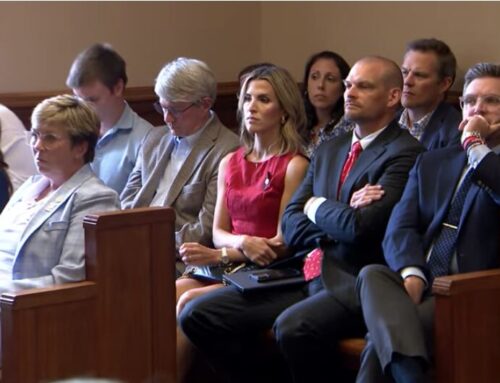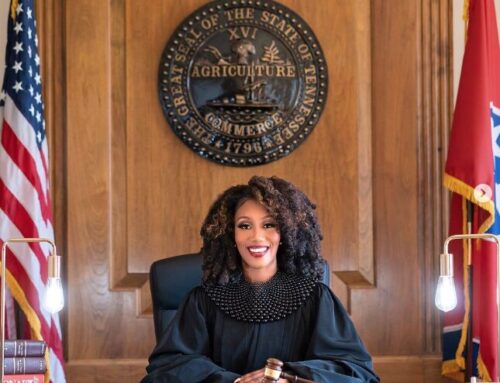How cop cameras are addressed by ACLU, Florida law and others
An article today in The Tennessean outlines some of the conversation taking place about the use of body cameras by local law enforcement, with the city of Franklin’s police chief saying she is waiting for state law to address usage before she rolls them out.
“I believe that body cameras will become a basic piece of law enforcement work,” Franklin Police Chief Deborah Faulkner said. “But the first agencies that implement body cameras will create case law and I want to avoid that.”
The newspaper reported that Faulkner urged lawmakers to look at an approach similar to Florida’s, which adopted a statute last year exempting footage from the state’s public records law that was shot inside a home or facilities that offer health care, mental health care, or social services. (See Florida’s statute at the bottom of this story.)
The ACLU, which has championed citizen privacy, most notably in the case of the NSA’s unprecedented phone surveillance program that was recently ruled illegal, suggests a different approach that makes video exempt from public records law based on the content, not necessarily on the place in which it was shot.
The ACLU’s approach also seeks a wider protection for citizen privacy in that it doesn’t allow police to keep, review and share video of citizens indefinitely, which would open up the door for other law enforcement purposes, such as systematic tracking or surveillance, face recognition or other analytics.
From The Tennessean article, Police body cameras spark debate about privacy in Tennessee:
Hedy Weinberg, executive director of the American Civil Liberties Union of Tennessee, said the ACLU advocates for the use of body cameras only when a clear but nuanced policy is in place.
“There should be very limited exceptions for those kinds of sensitive situations where there is footage inside a home,” she said.
Weinberg said there are ways of ensuring that private information about crime victims or other people who call on police is protected, without sacrificing the accountability that makes such programs worthwhile.
Rather than make any video taken in homes or other private spaces automatically off-limits for public review, the organization has advocated for designating video as “flagged or unflagged” based on what it captured.
If the encounter included a use of force or led to an arrest, for instance, then the footage should be “flagged,” even if it was taken in a home. That footage, Weinberg said, should be available for public review, with faces blurred and voices changed when it’s appropriate.
Other video that is deemed to be “unflagged” shouldn’t be kept as long and shouldn’t be released under public records laws, according to the ACLU.
Another option is to simply ask people if they want to be recorded, Weinberg said.
“What that means is that the officer should ask if the individual wants the camera turned off, and there needs to be footage of the person saying, ‘yes, please stop recording,’ ” she said. “That’s the best way to deal with the understandable concerns.”
To read more about the ACLU view, see its white paper: Police body-mounted cameras: With right policies in place, a win for all.
Excerpt from ACLU’s position on cop cameras:
Use of Recordings
The ACLU supports the use of cop cams for the purpose of police accountability and oversight. It’s vital that this technology not become a backdoor for any kind of systematic surveillance or tracking of the public. Since the records will be made, police departments need to be subject to strong rules around how they are used. The use of recordings should be allowed only in internal and external investigations of misconduct, and where the police have reasonable suspicion that a recording contains evidence of a crime. Otherwise, there is no reason that stored footage should even be reviewed by a human being before its retention period ends and it is permanently deleted. Nor should such footage be subject to face recognition searches or other analytics.
Subject Access
People recorded by cop cams should have access to, and the right to make copies of, those recordings, for however long the government maintains copies of them. That should also apply to disclosure to a third party if the subject consents, or to criminal defense lawyers seeking relevant evidence.
Public Disclosure
When should the public have access to cop cam videos held by the authorities? Public disclosure of government records can be a tricky issue pitting two important values against each other: the need for government oversight and openness, and privacy. Those values must be carefully balanced by policymakers. One way to do that is to attempt to minimize invasiveness when possible:
Public disclosure of any recording should be allowed with the consent of the subjects, as discussed above.
Redaction of video records should be used when feasible — blurring or blacking out of portions of video and/or distortion of audio to obscure the identity of subjects. If recordings are redacted, they should be discloseable.
Unredacted, unflagged recordings should not be publicly disclosed without consent of the subject. These are recordings where there is no indication of police misconduct or evidence of a crime, so the public oversight value is low. States may need to examine how such a policy interacts with their state open records laws.
Flagged recordings are those for which there is the highest likelihood of misconduct, and thus the ones where public oversight is most needed. Redaction of disclosed recordings is preferred, but when that is not feasible, unredacted flagged recordings should be publicly discloseable, because in such cases the need for oversight generally outweighs the privacy interests at stake.
Good technological controls
It is important that close attention be paid to the systems that handle the video data generated by these cameras.
Systems should be architected to ensure that segments of video cannot be destroyed. A recent case in Maryland illustrates the problem: surveillance video of an incident in which officers were accused of beating a student disappeared (the incident was also filmed by a bystander). An officer or department that has engaged in abuse or other wrongdoing will have a strong incentive to destroy evidence of that wrongdoing, so technology systems should be designed to prevent any tampering with such video.
In addition, all access to video records should be automatically recorded with immutable audit logs.
Systems should ensure that data retention and destruction schedules are properly maintained.
It is also important for systems be architected to ensure that video is only accessed when permitted according to the policies we’ve described above, and that rogue copies cannot be made. Officers should not be able to, for example, pass around video of a drunk city council member, or video generated by an officer responding to a call in a topless bar, or video of a citizen providing information on a local street gang.
If video is held by a cloud service or other third party, it should be encrypted end-to-end so that the service provider cannot access the video.
TCOG’s position on cop cameras:
To see video from a recent state hearing before the state Judiciary Committee(including testimony from TCOG): Hearing on body camera footage before the Tennessee State Senate Judiciary Committee (Body cameras start at 2:45). TCOG’s position has been that while some video shot by law enforcement should be exempt from public records law, the decision on what to release and what not to release should not be up to the local police chief alone. State lawmakers should be careful not to implement a policy that eliminates the accountability of police actions, no matter where they take place. For example, a video of an officer who uses lethal force or excessive force inside someone’s home should not be protected even if the state determines that the identity of the citizen in that situation should be.
The Tennessean reported that some law enforcement in Tennessee are already using or testing body cameras: the Knox County Sheriff’s Office an police departments in Millersville, Gallatin and Memphis.
Florida’s law on cop cameras:
A body camera recording, or a portion thereof, is confidential and exempt from s. 119.07(1) and s. 24(a), Art. of the State Constitution if the recording:
a. Is taken within the interior of a private residence;
b. Is taken within the interior of a facility that offers health care, mental health care, or social services; or
c. Is taken in a place that a reasonable person would expect to be private.
3. Notwithstanding subparagraph 2., a body camera recording may be disclosed by a law enforcement agency:
a. In furtherance of its official duties and responsibilities; or
b. To another governmental agency in the furtherance of its official duties and responsibilities.
4. A body camera recording, or a portion thereof, shall be disclosed by a law enforcement agency:
a. To a person recorded by a body camera; however, a law enforcement agency may disclose only those portions that are relevant to the person’s presence in the recording;
b. To the personal representative of a person recorded by a body camera; however, a law enforcement agency may disclose only those portions that are relevant to the represented person’s presence in the recording;
c. To a person not depicted in a body camera recording if the recording depicts a place in which the person lawfully resided, dwelled, or lodged at the time of the recording; however, a law enforcement agency may disclose only those portions that record the interior of such a place.
d. Pursuant to a court order
(I) In addition to any other grounds the court may consider in determining whether to order that a body camera recording be disclosed, the court shall consider whether:
(A) Disclosure is necessary to advance a compelling interest;
(B) The recording contains information that is otherwise exempt or confidential and exempt under the law;
(C) The person requesting disclosure is seeking to obtain evidence to determine legal issues in a case in which the person is a party;
(D) Disclosure would reveal information regarding a person that is of a highly sensitive personal nature;
(E) Disclosure may harm the reputation or jeopardize the safety of a person depicted in the recording;
(F) Confidentiality is necessary to prevent a serious and imminent threat to the fair, impartial, and orderly administration of justice;
(G) The recording could be redacted to protect privacy interests; and
(H) There is good cause to disclose all or portions of a recording.
(II) In any proceeding regarding the disclosure of a body camera recording, the law enforcement agency that made the recording shall be given reasonable notice of hearings and shall be given an opportunity to participate.
5. A law enforcement agency must retain a body camera recording for at least 90 days.
6. The exemption provided in subparagraph 2. applies retroactively.
7. This exemption does not supersede any other public records exemption that existed before or is created after the effective date of this exemption. Those portions of a recording which are protected from disclosure by another public records exemption shall continue to be exempt or confidential and exempt.
8. This paragraph is subject to the Open Government Sunset Review Act in accordance with s. 119.15 and shall stand repealed on October 2, 2020, unless reviewed and saved from repeal through reenactment by the Legislature.




